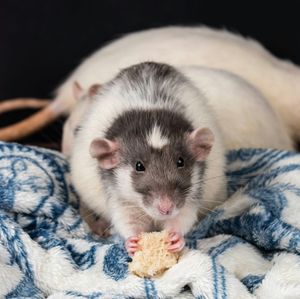
Rats are social, inquisitive animals who rarely bite, and that make great companions. Make sure to provide time outside of the cage to explore a safe area for enrichment.
Enclosure – Provide rats with a solid bottom cage at least 3 feet long and 2 feet wide.
Accessories – Provide several hides such as cardboard boxes as these not only are great hiding places, but rats enjoy destroying them as well. Toilet paper rolls, wooden chews, grass hay, newspaper, and other destructible toys (avoid plastic) provide good enrichment and chewing opportunities too. Rats will chew wood and plastic so only ceramic or metal dishes should be used.
Water - Water bowls get very dirty so must be cleaned frequently, water bottles provide a cleaner and more sanitary option.
Bedding - Carefresh (recycled shredded paper) bedding or layers of fleece bedding are the best options to use at the bottom of the cage. Rats urinate and defecate a lot so their cage should be cleaned frequently (at least 1-2 times weekly) to reduce waste odor and contamination.
Rodent blocks or fortified rat pellets are much healthier than seed mixes. Avoid mixes with nuts, corn, seeds, and fruit as these will lead to obesity. Human junk food should be avoided.
Spaying female rats before 16 weeks old is recommended to decrease the incidence of mammary tumor development. With good care rats can live up to 2-2.5 years.
Copyright © All Rights Reserved
